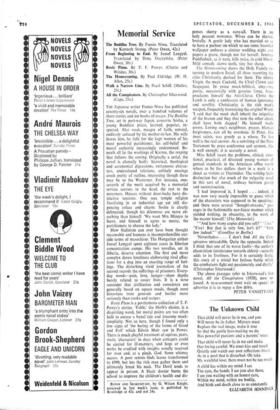Memorial Service
The Buddha Tree. By Fumio Niwa. Translated by Kenneth Strong. (Peter Owen, 42s.) From Beginning to End. By Jozsef Lengyel. Translated by Ilona Duczyriska. (Peter Owen, 30s.) Rosie Plum. By T. F. Powys. (Chatto and Windus, 30s.) The Homecoming. By Paul Eldridge. (W. H. Allen, 25s.) Walk a Narrow Line. By Pearl Schiff. (Muller, 25s.) AU the Conspirators. By Christopher Isherwood. (Cape, 21s.) THE Japanese writer Fumio Niwa has published seventy-six novels, over a hundred volumes of short stories and ten books of essays. The Buddha Tree, set in post-war Japan, concerns Soshu, a young Buddhist priest, learned, popular, re- spected. Also weak, meagre of faith, sensual, endlessly seduced by his mother-in-law. His wife leaves him, he falls for the kept woman of his most powerful parishioner, his self-belief and moral authority increasingly undermined. Be- neath all lie the workings of Karma, the reaping that follows the sowing. Originally a serial, the novel is clumsily built: historical, theological and ceremonial digressions, extraneous charac- ters, undeveloped relations, unlikely musings crush purity of outline, interesting though these may be to the Westerner. For instance, one- seventh of the merit acquired by a memorial service accrues to the dead, the rest to the mourners. Houses without door-locks have dis- tinctive tensions. One sees temple religion fossilising in an industrial age yet still dis- pensing solace and charm. Soshu is clearly delineated, though his dilemmas are more ab- sorbing than himself. 'We want Mrs Mineyo to leave, and himself to agree to marry, the parishioners to choose the lady.'
How Stalinism can ever have been thought reasonable and humane is incomprehensible out- side terms of masochism. The Hungarian author Jozsef Lengyel spent eighteen years in Siberian concentration camps. His two novellas, set in Siberia, deserve attention. The first and more complex shows loneliness elaborating rival affec- tions for a dog into an exacting range of feel- ings. The disturbing vivid journalism of the second records the sufferings of prisoners. Every- day words—pain, love, hunger—show depths barely related to cosier lives. It is a terse reminder that civilisation and conscience are generally based on square meals, though most historians treat generals and battles more seriously than cooks and recipes.
Rosie Plum is a posthumous collection of T. F. Powys's stories. 'Fable,' the blurb's choice, is a dispiriting word, for moral points are too often held to excuse a banal tale and tiresome mock- simplicity. Not so here, though I found only a few signs of 'the baring of the forms of Good and Evil' which Edwin Muir saw in Powys. There is much playful treatment of squires, peers, rustic 'characters' in days when cottagers could be ejected for ill-manners, and hogs or even moles be credited with insights usually reserved for man and, at a pinch, God. Some whimsy occurs. A poor sexton finds leaves transformed to £999, but lets the rich man gather them and ultimately break his neck. The Devil tends to appear in person. A black doctor burns the school to improve the children's health and dis-
BYRON AND SHAKESPEARE, by G. Wilson Knight, reviewed in last week's issue, is published by Routledge at 42s. and not 24s. penses sherry as a cure-all. There is no holy peasant nonsense. Wives can be shared, brutally. A gentle lady who has married so as to have a parlour on which to use some hoarded wallpaper endures a sinister wedding night and papers a grave, though not for herself. Jemirna Puddleduck, as it were, kills twice, in cold blood. Mild comedy shows teeth, tiny but sharp.
The Homecoming shows the Holy Family re- turning to modern Israel, all three resenting the roles Christianity devised for them. The idiotic Virgin, the meek Cuckold, the Chief Clown and Scapegoat. In prose mock-biblical, sing-song poetic, occasionally with genuine force, Jesus proclaims himself the Anti-Christ. Christ the Lamb is only a confession of human ignorance and servility. Christianity is the rich man's weapon, frequently travestying the original Word. 'I said that the meek shall inherit the iniquities of the brazen and they that turn the other cheek shall have both slapped.' He himself made errors. Loving one's neighbour, prayer, blanket forgiveness, can all be overdone. St Peter, like most saints, was greedy as a whore. To live well is the real answer. As a rewriting of the New Testament by press conference and sermon, this is well enough; it is scarcely a novel.
Miss Schiff treats the problems, ethical, emo- tional, practical, of divorced young women of genteel standards in the American office world where to be five dollars short in a week is a shock as violent as Thermidor. The writing lacks distinction but also much of the vulgarity usual in this sort of novel, midway between gossip and reconstruction.
'I had improved it, I hoped . . . indeed, it was now very nearly impossible to guess which of the characters was supposed to be speaking: and there were several "thought-streams," pas- sages in the fashionable neo-Joyce manner which yielded nothing, in obscurity, to the work of the master himself.' (The Memorial.) ' "And how many copies did you sell?" "Five." "Five! But that is very few, isn't it?" "Very few indeed."' (Goodbye to Berlin.) 'Nevertheless . . . I don't find All the Con- spirators unreadable. Quite the opposite. Indeed I think that one of its worst faults—the author's chauvinism (intolerance towards elders)—actually adds to its liveliness. For it is certainly lively, this story of a trivial but furious battle which the combatants fight out passionately and dirtily.' (Christopher Isherwood.) The above passages refer to Isherwood's first novel, All the Conspirators (1928), now re- issued. A re-assessment must wait on space: to advertise it is to repay a few debts.
PETER VANSITTART


































 Previous page
Previous page